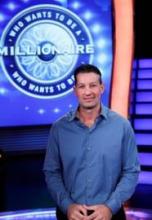More than a year after taking the test, the round of interviews, and much anticipation to be a contestant on "Who Wants to Be a Millionaire," Dr. James Perri finally got his chance this past November, competing on an episode that aired in late April. But even as he walked onto the stage, Dr. Perri didn’t want to be a millionaire – he wanted to make a difference. After all the final answers were in, Dr. Perri, an emergency physician at Presbyterian Hospital in Huntersville, N.C., pledged all of his winnings – $15,800 – to benefit brain tumor research.
The cause hits home for Dr. Perri, who at age 24 was diagnosed with oligodendroglioma, a rare brain tumor representing only 3% of primary brain tumors, according to the College of American Pathologists. After a successful round of chemotherapy and radiation, Dr. Perri was cancer free. He then moved with his job from Philadelphia to Huntersville, N.C.
In 2009, the cancer resurfaced, and Dr. Perri, then 36 years old, started another round of radiation and chemotherapy, forcing him to leave his position on the Relative Value Scale Update Committee (RUC). Again, however, the tumor was successfully removed, and Dr. Perri and his wife, Nancy – by then parents of Jack, 7, and Sofia, 5 – were inspired to use their experience to give a voice to this rare disease.
"[I was] just trying to take an active role in fighting a disease I have, which you have very little control over," Dr. Perri said in an interview. But he also took the next step and asked himself, "Okay, what can I do to fight not only what I have, but others have?" and bring attention to a disease that is "underrepresented," he said.
Very little funding is available to study oligodendroglioma, which means there is limited information about the condition itself, Nancy Perri said. She recalled contacting cancer researchers about oligodendroglioma, only to hear that while innovative ideas exist, the funding for studying them does not. So this past February, she completed steps necessary to establish a nonprofit – Operation Oligo Cure. The goal of the organization is to raise awareness and funding for clinical trials to test innovative treatments for oligodendroglioma. In April, they raised $1,000 during their Exercise for a Cure event featuring fitness instruction at a local gym where Nancy works part-time.
"This is my way of contributing, helping to try and make a change and regain some type of control in this situation," she said in an interview. "I can not only help my husband but [also] pay it forward to people who are in this type of situation."
To add to Dr. Perri’s game show winnings and donations from family and friends, the Perris are aiming to raise between $150,000 and $200,000 to fund trials testing strategies such as tumor vaccines or the role of genetics in preventing brain tumors, Dr. Perri said.
Although Dr. Perri didn’t walk away a millionaire, he did get the chance to share his story and shine a light on the struggle shared by others with oligodendroglioma.
"If you’re giving yourself more hope or [giving] others more hope, then that’s a good thing," Dr. Perri said.
To contribute to Operation Oligo Cure, go to www.oligocure.org.


